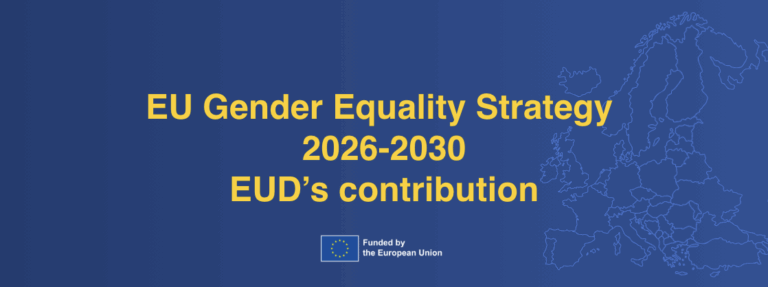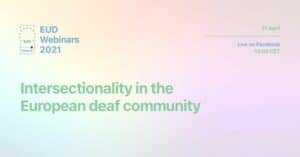The European Union of the Deaf (EUD) has submitted its feedback to the European Commission’s public consultation on the forthcoming Gender Equality Strategy 2026–2030. By engaging in this consultation, EUD contributes and supports the EU’s ongoing dedication to ensuring equal rights and opportunities for all women and girls, including deaf women and girls.
Gender Equality Strategy: a longstanding commitment of the European Union
The European Union has long recognised gender equality as a fundamental value and driver of economic, social, and political progress, responding to persistent inequalities through multi-year strategies to ensure women enjoy the same rights and opportunities as everyone else.
Under its latest Gender Equality Strategy 2020–2025, the EU has taken significant action, including the adoption of the Directive to combat violence against women and domestic violence (“VAW Directive”), the strengthening of work-life balance rights for parents and carers, and the launch of the European Care Strategy. These measures have contributed to advancing gender equality across Member States. The Strategy, along with several of its initiatives, has also addressed the rights of women and girls with disabilities, thus also the linguistic rights of deaf women and girls in the EU. For example, the VAW Directive sets obligations on Member States to ensure the availability and accessibility of helplines, support services, and preventive measures and information for persons with disabilities, thus these should include national sign languages.
Based on the outcomes of the 2020-2025 Strategy’s implementation and the current global context, the EU issued in March 2025 a Roadmap for Women’s Rights setting out long-term policy objectives and reaffirming its commitment to gender equality. The Roadmap’s key principles will form the foundation of the new Gender Equality Strategy 2026-2030 as the current strategy draws to a close. The European Commission launched a public consultation earlier this year inviting stakeholders to help shape this new strategy.
Gender Equality as an EUD Priority
Promoting gender equality has been and is one of EUD’s core priorities, as we have a dedicated Working Group on Gender Equality and have undertaken mainstream gender equality actions through policy and advocacy work. In recent years, we have designed and implemented several significant initiatives to foster the rights of deaf women in Europe, such as the 3rd European Deaf Women Forum, the Gender Report on Gender Based Violence,and the Toolkit on Maximising the Effectiveness of the Women’s Committee.
In this context, EUD welcomed the opportunity to provide targeted and evidence-based recommendations for the next Gender Equality Strategy.
NADs as contributors to the consultation
To ensure its contribution reflected the priorities of its members, the National Associations of the Deaf, EUD held a workshop during its General Assembly in May 2025. This session gathered valuable feedback directly from its members, complementing EUD’s existing resources.
The EUD’s contribution to the European Commission’s Public Consultation on the Gender Equality Strategy 2026-2030 included two components:
- Completion of the Commission’s questionnaire launched as a call for evidence, and
- Submission of an extensive written contribution to the public consultation outlining priority areas and recommendations.
Key Recommendations
In its submission, the EUD called for the Gender Equality Strategy 2026–2030 to adopt a truly intersectional approach, recognising and addressing the lived experiences of all women and girls, including deaf women and girls, women with disabilities, and those facing multiple forms of discrimination. It also underscored the importance of safeguarding the rights of gender-diverse persons, ensuring that all gender identities are explicitly recognised and protected across the EU’s gender equality actions. Among its core recommendations, EUD urged the European Commission to:
- Combat multiple and intersectional discrimination: Ensure that discrimination on the basis of deafness, disability, race, migration status, or other intersecting identities is addressed as a central pillar of the Strategy.
- Collect robust disaggregated data: Gather quantitative and qualitative data disaggregated by gender, disability, age, ethnicity, and LGBTIQ+ identity, with meaningful consultation of organisations of persons with disabilities (OPDs).
- Address gender-based violence (GBV): Develop accessible GBV prevention, protection, and support services in collaboration with Deaf communities, ensuring sign language access in awareness campaigns, preventive measures for deaf men and boys, and professional training for the legal sector and support services.
- Recognise gender diversity: Move beyond a binary understanding of gender by explicitly recognising the rights, experiences, and barriers faced by non-binary, transgender, and gender-diverse persons, including those who are deaf or have disabilities.
- Prioritise sexual and reproductive health and rights (SRHR): Treat SRHR as a standalone priority and conduct a European survey to map barriers faced by women and girls with disabilities and refugees, as recommended by the 3rd European Deaf Women’s Forum.
- Address the gendered impact of crises: Introduce a dedicated priority on crisis preparedness and response, ensuring inclusive gender-sensitive communication and disability-responsive protocols in contexts such as war, forced displacement, natural disasters, and public health emergencies.
Next Steps
The public consultation closed on Monday 11 August 2025. The European Commission will now analyse all contributions received, with the new Gender Equality Strategy 2026–2030 expected to be launched in March 2026. EUD will continue to monitor the process closely, ensuring that the voices and lived experiences of deaf women, girls, and gender-diverse persons are meaningfully reflected in the Gender Equality Strategy 2026-2030. Furthermore, EUD will follow up on any progress made in this field to ensure the upcoming gender equality actions are truly inclusive for the deaf communities.













